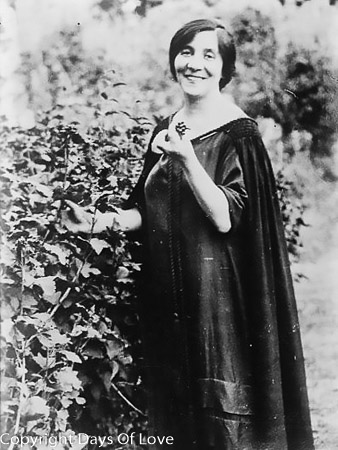Partner Denise Restout
Queer Places:
Ecole Normale de Musique de Paris, 114bis Boulevard Malesherbes, 75017 Paris, Francia
Fryderyk Chopin University of Music, 00 368, Okólnik 2, 00-368 Warszawa, Polonia
 Wanda
Aleksandra Landowska (5 July 1879 – 16 August 1959) was a Polish-French
harpsichordist whose performances, teaching, recordings and writings played a
large role in reviving the popularity of the harpsichord in the early 20th
century. She was possibly the lover of
Eva Palmer-Sikelianos.
Wanda
Aleksandra Landowska (5 July 1879 – 16 August 1959) was a Polish-French
harpsichordist whose performances, teaching, recordings and writings played a
large role in reviving the popularity of the harpsichord in the early 20th
century. She was possibly the lover of
Eva Palmer-Sikelianos.
Landowska was the first person to record Johann Sebastian Bach's
Goldberg Variations on the harpsichord (1933). She became a naturalized
French citizen in 1938.[1]
andowska was born in Warsaw to Jewish parents. Her father was a lawyer, and
her mother a linguist who translated Mark Twain into Polish. She began playing
piano at the age of four, and studied at the Warsaw Conservatory with the
senior Jan Kleczyński and Aleksander Michałowski. She also studied composition
under Heinrich Urban in Berlin, and had lessons in Paris with Moritz
Moszkowski. After marrying the Polish folklorist Henry Lew in 1900 in Paris,
she taught piano at the Schola Cantorum there (1900–12).
She later taught harpsichord at the Berlin Hochschule für Musik (1912–19).
Deeply interested in musicology, and particularly in the works of Bach,
Couperin and Rameau, she toured the museums of Europe looking at original
keyboard instruments; she acquired old instruments and had new ones made at
her request by Pleyel and Company. These were large, heavily built
harpsichords with a 16-foot stop (a set of strings an octave below normal
pitch) and owed much to piano construction. Responding to criticism by fellow
Bach specialist Pablo Casals, she once said: "You play Bach your way, and I'll
play him 'his' way."[2]
A number of important new works were written for her:
Manuel de Falla's
El retablo de maese Pedro (Master Peter's Puppet Show) marked
the return of the harpsichord to the modern orchestra. De Falla later wrote a
harpsichord concerto for her, and
Francis Poulenc
composed his Concert champêtre for her.[3]
She taught at the Curtis Institute of Music from 1925-28. She established
the École de Musique Ancienne at Paris in 1925: from 1927, her home in
Saint-Leu-la-Forêt became a center for the performance and study of old music.
During this time Landowska frequented the salon of open lesbian
Natalie Clifford Barney, to both socialize and perform.[4]
When the German Army invaded France, Landowska fled with her student and
domestic partner Denise
Restout.[4]
After leaving Saint-Leu in 1940, sojourning in Banyuls-sur-Mer, a commune in
southern France, where her friend, sculptor Aristide Maillol was living, they
sailed from Lisbon to the United States. Believing the Nazi threat to be
temporary she had left with only two suitcases.[5]
She arrived in New York on 7 December 1941, the date of the bombing of Pearl
Harbor. Her home in Saint-Leu was looted, and her instruments and manuscripts
were stolen, so she arrived in the United States essentially with no assets.[4]
Her 1942 performance of Bach's "Goldberg Variations" at New York's Town
Hall was the first occasion in the 20th century where the piece was played on
the harpsichord, the instrument for which it had been written.[6]
She settled in Lakeville, Connecticut in 1949, and re-established herself
as a performer and teacher in the United States, touring extensively. Her last
public performance was in 1954.[6]
Her partner, Denise Restout, was editor and translator of her writings on
music, including Musique ancienne, and Landowska on Music,
published posthumously in 1964.[4]
Landowska recorded extensively for the Victor Talking Machine Company/RCA
Victor and The Gramophone Company/EMI.
She died in Lakeville, Connecticut on 16 August 1959, aged 80.[7]
A Camera Three series program, a dramatization of some writings of
Landowska as read by actress Agnes Moorehead, entitled Reminiscences of
Wanda Landowska aired 17 March 1963 on CBS.[8]
My published books:


BACK TO HOME PAGE

- https://en.wikipedia.org/wiki/Wanda_Landowska
-
https://press.princeton.edu/ideas/artemis-leontis-on-eva-palmer-sikelianos-a-life-in-ruins
 Wanda
Aleksandra Landowska (5 July 1879 – 16 August 1959) was a Polish-French
harpsichordist whose performances, teaching, recordings and writings played a
large role in reviving the popularity of the harpsichord in the early 20th
century. She was possibly the lover of
Eva Palmer-Sikelianos.
Wanda
Aleksandra Landowska (5 July 1879 – 16 August 1959) was a Polish-French
harpsichordist whose performances, teaching, recordings and writings played a
large role in reviving the popularity of the harpsichord in the early 20th
century. She was possibly the lover of
Eva Palmer-Sikelianos.
